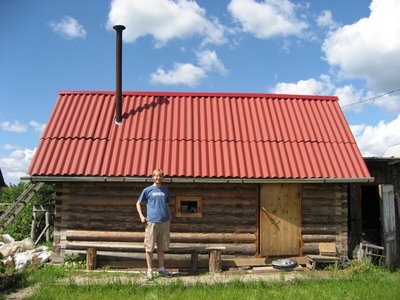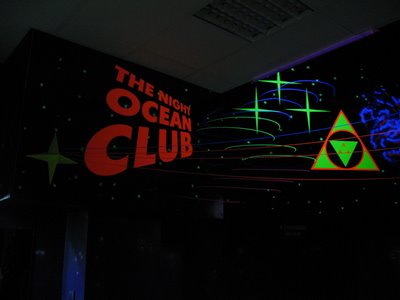Collecting myself after "two weekends" of excesses, Part 4 (The Dacha), July 16, 2006

Hanging out with Katya a day or two before our festival of dance, I mentioned that my host family did not own a dacha and that Liza told us if we ever had the opportunity we should experience a real Russian banya (steam bath). She listened to my sad state of affairs and suggested that perhaps I would be able to join her family in going to her aunt’s dacha for picnic and banya. The last words of her invitation barely escaped her lips before I pushed out my reply:
“Yes! I would love to.”
With a confirming phone call to her aunt the deal was done and so I found myself walking with Katya from the center square to her apartment on one sunny Sunday morning. Inside the modest, cozy flat I met her mother and an exchange teacher from France—named Assad—staying with Katya for a few weeks. Also, a friend of her family boasting her own French guest, Elizabeth, was in the living room preparing for the dacha.
There wasn’t enough room for everyone in Katya’s aunt’s car; so when she pulled up outside, Katya and I trekked over to the nearest bus stop to catch Number 6 out of town. As is typical for well-coordinated travel plans, on the way to the dacha we passed the stop where I had grabbed the Number 19 downtown in order to meet Katya. Hitting the end of Prospekt Mira, our extended-length bus (an additional section of seating and standing area is adjoined to the front of the bus by a rotating joint and accordion-style casing) continued down the two-lane road heading straight west away from the high-rise apartments on the outskirts of Novgorod.
The buildings we along the road soon transitioned into the traditional Russian cottage-styles—using diagonal wooden slats in intersecting patterns for siding, usually painted in bright greens and whites though more often simply needing a paint job. We traveled with other Russians heading to their dachas, carrying picnic supplies or home repair materials. The tools and house parts were indicative of the Russian pastime directly connected to owning a dacha—that being the building and maintaining of it. The structures are thin-walled, with often improvised fences raised around their small plots made of scrap wood and wire—perhaps even lined up beer bottles for a brilliant accent that I saw around one dacha. Inside the fences are usually gardening row boasting a variety of fruits, vegetables, and flowers. And in all these respects, Katya’s aunt’s dacha was no different.
We exited the bus near a marshy strip of land backed by a thin tree line, behind which I could see the roofs of a small village of summer homes extending into the distance. Following the narrow dirt roads, Katya and I eventually found the right dacha with her aunt’s car jammed into the small space between the “road” and the plot. Taking the path leading alongside the two-story cottage and the southern part of the small garden, I could see light smoke puffing from the chimney popping out the top of the banya at the back of her yard.
I put down my bag filled with bathing suit, towel, gift, and camera. They had already started cooking some pork shish kebobs—a favorite dish here which I would not be partaking in since I was: 1) already full from a big breakfast and 2) not interested in tempting any indigestion by mixing the red meat’s oils with my poorly prepared stomach.
After some snapshots and a quick tour of the grounds and the lovely little house, I helped cook the shish kebobs by manning a water spritzer fashioned form an empty plastic bottle of Nikola Kvass with holes punched in the cap. Kvass, I later found out, is a drink made from fermenting oven-dried bread, water, and sugar and it is roughly equivalent here—if you place it at the opposite side of the soft drink spectrum—to America’s soda, although globalization has made Pepsi and Coke as omnipresent here as anywhere else. My job, spritzer in hand, was to keep the hot coals at bay with a squirt of water in order to prevent any charring of the pork cubes.
When all was cooked and ready, we sat in the kitchen and commenced the picnic portion of our afternoon. Out came a bottle of vodka and some beer. I was not terribly interested in the burn of the clear liquor right then, but lacking any moral opposition to the act and wishing to show my appreciation, I took a small shot to toast with my hosts. During the meal, I focused most of my attention on the delicious eggplant slices cooked with raw tomato and sour cream made by Katya’s mother. Already full from my host mother’s healthy, hefty breakfast, I re-stuffed myself at the summer house table, figuring I could sweat it all off in the banya later.
After tea, Katya and I took a walk around and I snapped some pictures of the other dachas in little ramshackle village. The walk helped me get some much needed digestion goign.
Upon our return, Katya’s aunt was already parading around in a towel with a very visible glow on her face from the sweat of banya.
“You can go in!”
“Us? Now?”
“Yes! Go!”
Inside the dacha, I stripped down to nothing and wrapped my beach towel around my bare body. If the situation would have been unisex, I would have been immersing myself fully nude—the absolute true way to do banya. But alas, Katya and I were sharing the steam, so towels it was.
The exterior door to what I thought was probably pretty similar to an Indian Longhouse opened into a waiting room with towels, seats, and a small CD player brought in to fill the space with pop music generously donated by one of the many Russian radio stations, which seem to have ubiquitous signal strength suggesting to me that rules here are not as strict as the FCC’s. We sat and talked to Assad for a while who was cooling off from a recent visit to the hot room. Katya’s aunt soon joined us, though, and insisted we go all the way in, so we walked first into the adjoining middle room where a large barrel of cool water sat in the corner. Numerous buckets and basins littered the floor, wooden benches were setup along the walls, and some soap and scrubbing brushes hung near the door. Katya and I proceeded into the final room then. The door’s handle—or rather the entire door—was quite hot, as was the floor, benches/beds, walls, and air inside this last room. I could almost feel my pores checking their water reserves and dilating in anticipation while the door closed.
Katya warned me not to touch the metal stove in the corner, which was an obvious no-no, yet always a good reminder for someone that tends to lose track of where their lengthy limbs decide to go. Now, normally, I am not very good with excesses of heat and was wondering how soon the banya experience would start to boil over my feeble thermometer. But I managed to adjust to the warmth, despite some labored breathing. I think sans towel would definitely have been better.
It was hard to tell how long our first immersion lasted, but our conversation kept us afloat despite our lethargy from the booty-shaking excesses of the previous night—plus, the beatings with birch branches helped a lot.
Yeah, that’s right… birch branch beating. A good lashing is, in fact, part of the traditional experience.
It started with me innocently asking Katya what the branches were for—it seemed pretty odd to have these bits of the foliage just simply strewn about the place.
“Oh. Those are for, like, hitting against your skin. It’s good for you. Do you want to try?”
“Absolutely yes. I want the whole experience.”
“Ok. Lay down here and I will do it.”
So I laid down on my stomach and prepared the nerves on my back for whatever may come.
“You may or may not like it.”
“Do you like it?”
“Sometimes I do.”
“It’s really good for you, though. It helps clear out your skin.”
Katya dipped a bundle of the branches in a basin of water on the floor and began the ritual. The first slap/smack/spank of the birch leaves made my eyes pop open and my muscles tense.
“Is it ok?” she laughed.
“Yeah, actually, it feels good. Go ahead.”
For about five or ten minutes I received the sweaty, stinging hot beating of a lifetime. It really felt good. Even though I let out a few obligatory and sarcastic BDSM “Oh Yeahs,” I seriously was enjoying the real Russian treatment.
We switched roles and I got to be master with the leafy cat o’ nine tails on Katya’s back. With a few more laughs we left the steam room, thoroughly soaked in our own sweat, stopping to clean off the residual leaves with water from the middle room’s barrel.
I wished Blair had been there to join in the fun. I would like nothing more than to have gone blow for blow with her and the birch branches. But back in the room with the exterior door, Katya was great company and we talked about how her aunt built the entire banya herself. I was impressed by the story of her inheriting the dacha from her father and fulfilling the family’s dream to build a banya there. It’s an expensive and time-consuming endeavor which shespent many a summer day toiling on. It was a banya in rare form, too, because of its three room construction, all completed using the traditional building process—involving logs cut to size and stacked cabin-style with only a mixture of sod and hay as the insulation and binder between each them in the walls.
Katya and I ventured into the banya twice more with plenty of birch branch beating to boot. It rained at one point so we went outside to enjoy the cold drops on our hot skin. During our second immersion, Katya wanted to turn up the heat, so she added some water to the hot rocks in the stove sending fresh steam rushing into my face—this I couldn’t handle—and I had to escape the pain and save the whiskers on my face from melting off.
Eventually, we were well sweated out and ready to shed the towels for clothes again. Finishing the whole banya process involved a lot of cold water and scrubbing. We took turns using the middle room, scraping the dead skin off our bodies with the brushes and washcloths and then liberally dumping water over our heads to rinse it all off.
Stepping out of the log building for the last time, I felt pretty amazing. It was a wonderfully refreshed feeling, like my body had just enjoyed a cathartic rubdown.
Thanking Katya’s aunt profusely, I offered her my gift—a collector’s tin of Hershey’s kisses. We opened them around the table along with leftovers and tea before going home. I’m never sure how hometown candy will go over because most chocolate here is very different from American-style milk chocolate. But the kisses seemed to go over well as crumpled wrapper after crumpled wrapper hit the table.
With another rain storm looming, Katya and I said our goodbyes and took off for the bus stop, making it just before the water started to pour down on the quiet Russian landscape surrounding us. Before I got off the bus, Katya said that she might visit her aunt’s dacha again in a few weeks.
“You would be welcome to come I’m sure.”
“I would love to go again.”

